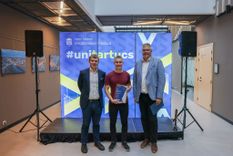“Breaking problems down into smaller, more manageable chunks is a good mindset for tackling any problem.”
Each year since 2017, we are granting a fellowship of 5000€ to an excellent master’s student of computer science, data science, and software engineering. The fellowship gives the opportunity for collaborations with our researchers and a paid internship position at Cybernetica.
The recipient of this year’s fellowship Herman Rull is full of curiosity towards the IT and is a truly knowledgeable student, fully worth of the scholarship. Herman has had interest towards programming from an early age – the computer games sparked it in his childhood.
We believe Herman is on a path of making great things happen and we are looking forward to his internship with us.
Get to know Herman better below.
What sparked your interest towards technology in the first place?
I have enjoyed playing computer games since I was a child. Even with graphics of ’90s and ’00s the games were extremely immersive. So, the mythical creatures called “Programmers”, that were behind these games, seemed like the coolest people in the world. Just by writing some commands on a computer, they created these magical worlds. So, it can be said, that my gaming history sparked the interest towards computers and computer science in general.
How has your passion towards computer science changed throughout the years?
What projects have you worked on independently, what kind of IT directions interest you the most etc.
First of all, I have come to realize that there is no magic behind these awesome creations – just a bunch of math, that sometimes works like magic.
Secondly, I have started to appreciate problems in their abstract form. In a sense, computer games and programming are similar – you have a goal and you want to achieve it under certain constraints. So, you have to make the right trade-offs and to get an optimal result.
I have not done as many solo projects as during my bachelor studies in University of Tartu, there were always a lot of interesting group projects and challenging homework. In between them, I have done different online challenges like Advent of Code and Project Euler.
Currently I am the most interested in the world of quantum computing. It seems like a young field, that is still missing some major breakthroughs, but it has a lot of potential.
Where do you come from and what made you choose computer science as a career path?
I come from a family of doctors and the natural course of action for me would have been to become a doctor myself. In high school while studying natural sciences in depth, I participated in the Open Competition of Computer Science organized by University of Tartu. With the help of Google, I managed to complete some of the tasks and I really enjoyed the process, much more than the regular schoolwork. After that, I got absorbed in the computer world. I took the introductory MOOC-s that University of Tartu offered, watched a ton of YouTube tutorials and made some basic games in Python. All in all, by the end of high school I knew for sure that I wanted to study IT.
What are you most excited about working on during your internship at Cybernetica?
Cybernetica seems to be one of these companies, where research goes alongside software development. During my internship, I hope to see how this dynamic works in practice and to determine whether I am keener on research or developing.
Where do you see your career path moving after completing your studies in computer science?
Currently I am exploring different opportunities. Thanks to the fellowship I can take up both fun and difficult challenges to develop my set of skills in computer sciences without worrying too much about the grades. If I find a topic that draws me in and academic writing gets easier for me, I will continue in the academia. Otherwise, I hope get to work as a software developer in a domain that is meaningful and challenging to me.
What in your opinion will be the next major breakthroughs in ways computer science affects people’s lives in general?
Certainly, the NFT-s – the fact that you can prove that you paid for pixels of a rock is a total gamechanger. For real though, I think in foreseeable future, most progress will come from optimizing different machine learning methods and applying them in different areas.
Going out on a limb and making a bit riskier prediction, I would say that the next big thing affecting people’s lives will be augmented reality. I find that there is a lot of value by manipulating the world in small details. When I am in the library, on a bus or a train with my laptop, I would like to have the same multiple screen setup as I have at home. Or when I am cooking, I would love to have the recipe fixed on the fridge without having to find the cookbook and making a copy of a page.
What life lessons would you share with those who are still considering pursuing an education or a career in IT?
I think studying IT is very practical. Breaking problems down into smaller, more manageable chunks is a good mindset for tackling any problem. At the same time, I believe that the biggest impact comes from combining technical skills with domain specific knowledge. So, in my opinion, it is really important to keep the child-like curiosity alive and dig into topics that seem interesting.
